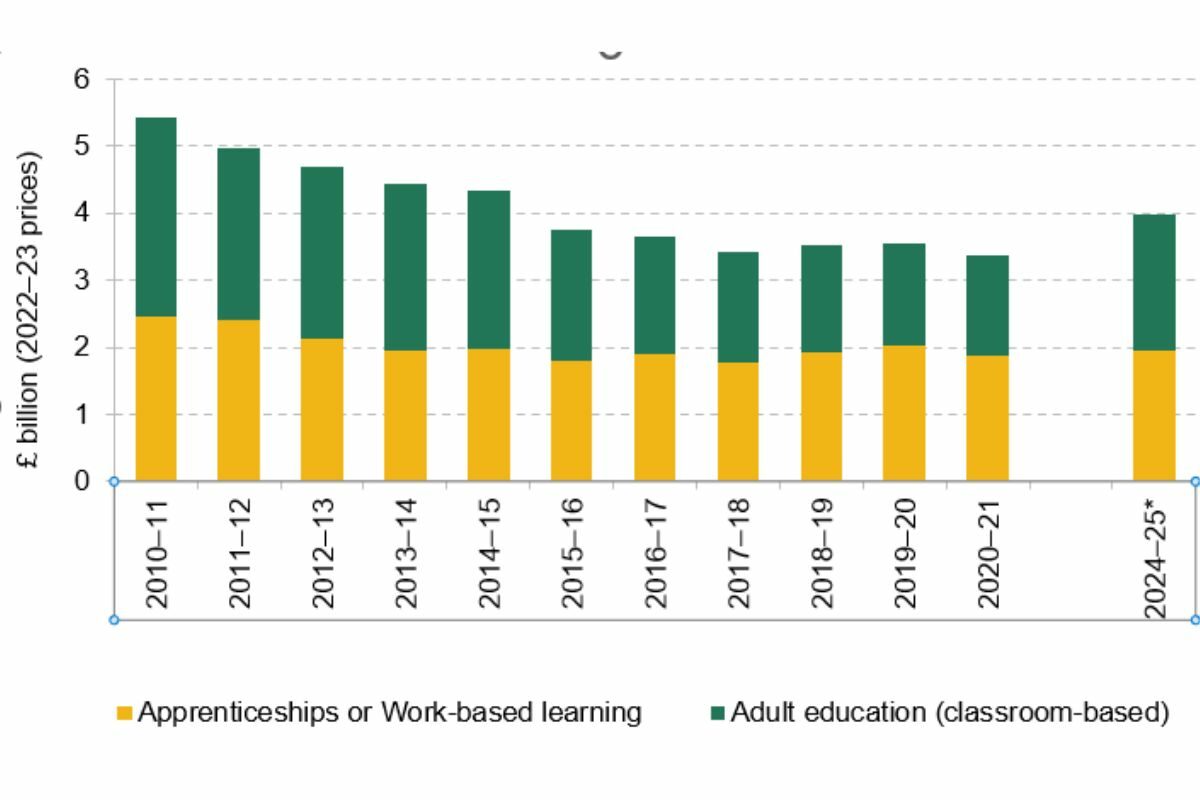Delivering a Lifetime Skills Guarantee

The UK government has committed to deliver a ‘Lifetime Skills Guarantee’ – a commitment to provide every adult with the training and education they need throughout their lifetime. There are two major policies which underpin this ambitious objective: (i) an increase in government spending to support adults who currently have few qualifications, and (ii) making the post-18 student finance system more flexible. In this article, we summarise analysis from our recent report on the impact of these reforms.
£900 million boost for adult education and skills
In last year’s Spending Review, the government allocated an additional £900 million in spending on adult education and apprenticeships in 2024-25 as compared with 2019-20. However, this extra money must be viewed in the context of a decade of declining adult education spending. Over the last decade, total spending on adult education and apprenticeships fell by 38%. Even with the additional £900 million spending on skills in 2024-25, the sharp cuts in spending in the preceding decade mean this will only restore spending to 2015 levels – 25% lower than spending in 2010. Hence, the government’s spending plans only partially reverse previous cuts.
Total spending on adult education and apprenticeships (actual, and projected for 2024–25)

Potential value of the extra spending
This money is set to be spent across a range of different programmes that will primarily benefit adults seeking basic skills or low-level qualifications, including:
- £550m to partially restore public funding for adults taking their first full Level 3 qualifications, new skills bootcamps as well as other reforms to adult education funding;
- £170 million in increased apprenticeship funding by 2024–25;
- £190 million for a new programme called ‘Multiply’ to improve numeracy skills across the UK.
We have good evidence on the potential impact of greater funding for Level 3 qualifications, a more traditional form of adult education. The UK evidence suggests extra qualifications at Level 3 can improve adult earning by about 9%. We also have excellent evidence from Norway, which attempted a similar reform to the Lifetime Skills Guarantee in the 2000s by providing funding for adults to return to education later in life to complete school-level qualifications. A recent study found this reform significantly improved the outcomes of high school dropouts, especially for women. The researchers estimate that full-time employment was 6.5% higher among women who benefited from the reform and they were also significantly more likely to go on to higher education.
Extra funding for skills bootcamps and the “Multiply” programme is a bit different as they are shorter programmes, focused on specific occupational or basic skills and are unlikely to result in formal qualifications. This might not be a bad thing if it helps low-skilled adults move into employment, but these approaches are less tested and might be of less value in the long-run.
A new loan entitlement for post-18 education
The government has also committed to a new ‘Lifelong Loan Entitlement’ for post-18 education, which will be introduced in 2025. This will give individuals the opportunity to access funding for four years of post-18 education in a more flexible way than is currently possible.
Under the existing system it’s already possible to access funding for four years of post-18 education, so what will the new entitlement change? There are three key changes from the existing funding system:
- Learners will able to access funding for specific modules rather than entire qualifications or years of study;
- The funding systems for higher education and further education will be unified;
- There will be a relaxation of restrictions that make it difficult for learners to access funding for qualifications at or below their highest current level.
Taken together these reforms should give adults greater flexibility over their education. The move to a modular-based system should make it simpler for learners to study shorter courses, which is likely to be particularly beneficial for mature learners and those wanting to combine education with other commitments. The relaxation of restrictions on which courses learners can access funding should make it easier to pursue sub-degree qualifications, such as higher technical qualifications.
Unfortunately, there are a number of unknowns that make it difficult to predict the likely impact of the Lifelong Loan Entitlement:
- Will universities and colleges actually provide modular courses?
- Which courses will be eligible for funding?
- How exactly will restrictions on learners accessing funding for courses at or below their existing level be changed?
In September there will be trials of modular provision in select universities and the government is currently consulting on the last two questions. Given that the Lifelong Loan Entitlement is due to be introduced in 2025 it is essential we get answers to these questions soon.
Summary
The UK is widely recognised as having an adult skills problem. The government have pledged to deliver a Lifetime Skills Guarantee to address this issue, which will lead to a significant increase in spending on adult education and reforms to the post-18 student finance system. The additional spending will create more second chances for those who currently have few qualifications and the Lifelong Loan Entitlement could make it easier to access more advanced education and training. However, the new spending only partially reverses previous cuts and there remains much uncertainty about the Lifelong Entitlement.












Responses